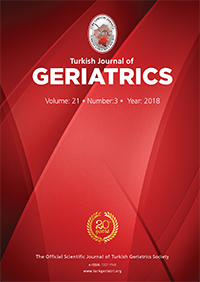2ńįstanbul University ńįstanbul Faculty of Medicine, Department of Physical Medicine and Rehabilitation, ńįstanbul, Turkey DOI : 10.31086/tjgeri.2018344043 Introduction: Various factors may affect the functional balance of older adults. This study aimed to investigate the factors associated with functional balance in older adults living in a community.
Materials and Method: In total, 160 people ?65 years of age were included in the study. The Cumulative Illness Rating Scale was used for scoring comorbidities. Functional balance was evaluated with the Activities-specific Balance Confidence scale. The Hospital Anxiety and Depression Scale was used for assessing emotional state. Finally, cognitive status was evaluated with the Mini-Mental State Examination. The factors associated with functional balance were determined using multivariate logistic regression analysis in patients with lower balance confidence.
Results: The mean age was 71.3¬Ī5.8 years. The group of participants with lower balance confidence (Activities-specific Balance Confidence score ?67) had increased age, height, lower extremity pain, sleeplessness, falling frequency, hypertension, ischaemic heart disease and anaemia ratios, number of drugs used, female ratio and single living ratio; higher Cumulative Illness Rating Scale, Hospital Anxiety and Depression Scale scores and significantly lower (p<0.05) Mini-Mental State Examination scores. The multivariate reduced model analysis revealed that age, height, marital status, number of drugs, number of comorbidities and the anxiety score had statistically significant effects (p<0.05) on functional balance.
Conclusion: In clinical practice, it will be useful to consider such factors while evaluating balance in older adults. In this study, the predictors of balance confidence in older adults included age, height, marital status, number of drugs used, number of comorbidities and anxiety level.
Keywords : Aged; Accidental falls; Balance, Postural
